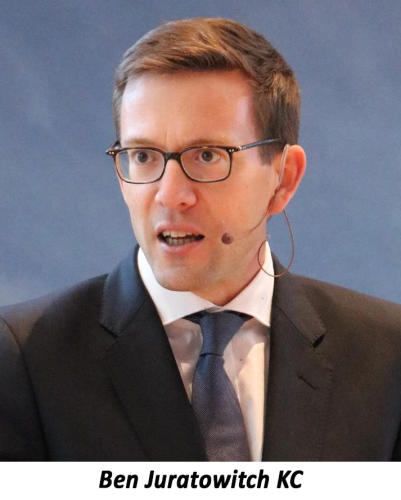Photo: Image from Portico’s April 2021 Environmental Compliance Plan showing final proposed land reclamation at the Port of Magical project site
Minister says Portico is fulfilling ECP requirements
BELMOPAN, Mon. July 3, 2023
For weeks, Portico Enterprises Limited (PEL) has been under sustained attack over its October 1, 2020 signing of a Definitive Agreement (DA) that the Briceño Administration says it will renegotiate. The secretive circumstances surrounding the signing of the agreement by UDP Minister Erwin Contreras and its fiscal incentives benevolence have been viewed as shameful. Now, the process leading to Portico’s environmental clearance and the fulfilment of the requirements under the attendant Environmental Compliance Plan (ECP) for Port of Magical Belize are also being called into question. Allan Herrera, the lead local consultant for the proposed Waterloo Port of Belize cruise terminal project on June 26 wrote Chief Environmental Officer Anthony Mai to question Portico’s compliance.
However, on Friday, June 30, during the segment of questions to Ministers, the Honorable Orlando Habet, minister responsible for Sustainable Development, declared Portico to be in compliance with its ECP. He provided a lengthy explanation and said that the ECP is to be completed in 6 phases, with at least 50% of one phase having to be completed before subsequent phases could begin. We note that the 29-page ECP signed on April 9, 2021 outlines that Portico agreed to commence the implementation of the terms and conditions contained in the ECP within two years from its signing. Incompliance would result in Portico having to re-apply for environmental clearance and a new ECP would have to be prepared. It also states that disregard of the terms and conditions of the ECP “may result in the Developer’s permits and environmental clearance being temporarily suspended. If corrective action is not taken, within the specified period of time opportunely communicated by the DOE and/or authority to the Developer, then this could result in revocation.” The language, therefore, is not entirely rigid.
Minister Habet reiterated, “the ECP granted a two-year period for the implementation and terms of the ECP, which the company has met. Kindly note that as per Phase 1 of the signed ECP, Port of Magical has, on July 12, 2022 submitted the detailed design of the peninsula … The company also informed the DOE of the status of the Manatee Management Plan, the Rapid Ecological Assessment (REA), the Dewatering Site, Soil Investigations – and the status was that these documents were being prepared as per conditions of the ECP and would be submitted shortly. On August 2, 2022, the company submitted a request for permission to conduct core sampling that will generate information for the establishment of essential infrastructure on the project site. A letter of no objection was granted to the company on August 18, 2022. On April 11, 2023, the company also submitted to the DOE the management Plan for the Antillean Manatee which has been shared with the Fisheries Department … A reclamation work plan is being reviewed by the DOE and the Mining Unit of the Ministry of Natural Resources. Also, they submitted the draft water quality monitoring program which has been reviewed and feedback provided to the company. Emergency response plans, as per requirement 3.13 of the ECP, which are being reviewed by the DOE at the moment. On June 6, 2023 the first draft Rapid Ecological Assessment was submitted for review and the Department of the Environment responded to strengthen the assessment on June 16, 2023.” The Minister did not address the point made by Herrera that Portico had not submitted a couple documents by a specified timeline of three months after the signing of the ECP. The Minister only alluded to the company sending in communication to indicate it was working on the documents.
Meanwhile, whereas Herrera shared that a site visit showed that no construction was happening yet, Minister Habet explained that “as per phase 1, none is absolutely required.” The Minister further explained that because no substantive physical work has started at the site, no inspection has been conducted as yet, but one was scheduled to take place on June 30 by a team that would consist of representatives from the Belize Port Authority, the Mining Unit, the Fisheries Department, the Forest Department, and the Coastal Zone Management Authority. According to Habet, the site inspection will reveal if any non-compliance exists at the project site level, which the company will be required to address in a reasonable timeframe.
The Minister summarized, “it is the opinion of the DOE that Port of Magical is currently in compliance with their ECP because Phase 1 deals mostly with the submission of designs, plans and specifications which the company has done.” He emphasized that many other requirements of the ECP are not applicable at this stage of development. He also reported that the DOE anticipates that the company will submit a request to begin Phase 2 as soon as the review of the REA is finalized. He concluded that the company “… has completed approximately the 100% of its ECP requirements, and approximately 60% has already been reviewed and accepted.”
As to the approval from the Lands and Surveys Department for the use of the seabed, which was a sticking point for some members of the National Environmental Appraisal Committee (NEAC), that requirement is not specifically listed in the pages of the ECP that outline the 6 phases of the project. However, it is outlined at section 3.5.4 which states: “the Developer shall obtain approval from the Lands and Surveys Department, prior to the use of the seabed for activities such as the construction of the artificial peninsula, structures associated with the land creation activities, retreat island, jetties, over-the-water structures, access channel and beach nourishment.”
So, whereas we now know that Government officials have put their stamp of approval on the progression of Portico’s fulfilment of its ECP, on June 29, 2023, Portico fired off an attorney letter of its own calling for the revocation of environmental clearance for the Port Coral project spearheaded by Stake Bank Enterprise Ltd. (SBEL). Attorney David Morales asserted to Chief Environmental Officer, Anthony Mai that SBEL has committed 14 infractions in breach of its ECP. If, in fact, the infractions are confirmed, it would be notable, especially given how far along the Port Coral project is in its construction. The infractions Morales references are not minor. They include the permit for the use of the seabed, no approvals for the structures built over the 66-ft reserve, an absence of mitigation measures to minimize sedimentation of the marina basins, and no Solid Waste Management Plan.
Morales also wrote that Stake Bank has not paid the required monitoring fees in the sum of $700,000. He shared that while on Channel 7’s Uncut on June 14, Stake Bank director Michael Feinstein admitted as much. Feinstein had explained that during the COVID-19 pandemic, there was no inspection at the project site; however, the company is still being charged a monitoring fee. He called it a mistake that will be corrected because in discussions they have had with officials, they have realized their error. Morales, for his part, told Mai, “considering the above, we trust that you will take action by revoking Stake Bank’s Environmental Clearance, or direct Stake Bank to remedy the infractions before it is allowed to proceed any further with the project.”
There was a second legal opinion on the Portico Definitive Agreement

In the ongoing ports saga, Channel 7’s Jules Vasquez disclosed today, Monday, July 3, that he received a Cabinet-level leak of a legal opinion sought from Queen Counsel, Ben Juratowitch, who represents Belize in our ICJ case against Guatemala. The 53-page opinion dated April 20, 2023, takes into consideration that the agreement was not approved by Parliament, Cabinet, the Government Investment Committee, the Prime Minister nor the Attorney General, and that tourism and ports were not within the portfolio of the then UDP Minister who signed the agreement—Erwin Contreras. Juratowitch wrote that even if Contreras “did have actual or ostensible authority to enter into the Agreement, it could still be unenforceable due to illegality because of its content.” He stated, “This appears to be a clear case of illegality. The Executive simply cannot bind the Legislature to pass legislation. That is a sovereign decision for the Legislature to make, unfettered by any constraints purportedly imposed by any minister by way of contract with a private party.” He added that, were such an agreement to be binding, it would mean that “a single minister would be able without such consultation unilaterally to force legislation to be introduced into the National Assembly, and to oblige the Government, on pain of damages payable by the Government to a private party, to cause it to be passed, irrespective of any positions expressed in or accepted by individual members of the National Assembly as a whole.” But Juratowitch went even further. He wrote that once the Government has concluded that a minister signed a contract he had no authority to conclude, then it is incumbent on the Government to “take action to remedy the situation … because the Government should not tolerate a contract it knows to be unlawful and because, if it did, it may ultimately be held to have ratified the contract so far as any question of authority of the Minister was concerned.” Juratowitch then affirmed that once the Government became aware of the existence of the Definitive Agreement, it should have notified Portico of its invalidity and unenforceability and then proceeded to “seek to agree with it a fresh contract…” Juratowitch’s opinion is that to proceed with the agreement as is would simply compound its illegality, leading to a potential challenge in the future and “would not be a credible or lawful course of action.”
Notably, even after that cogent legal opinion from an eminent international attorney, the Ministry of Finance took a white paper to Cabinet dated May 15 with draft supporting legislation for the Portico Definitive Agreement, incorporating wholesale all the concessions contained therein.
Interestingly, today the Government issued a press release with the subject, “Government Reiterates Position on Portico.” That release states that Prime Minister John Briceño at the June 16 House Meeting informed Belize that the UDP Portico Definitive Agreement would not be proceeded with. The release states, “this decision was reached after an informed discussion in Cabinet and after receiving legal advice from multiple attorneys of international repute.” It proceeds to report that, given Royal Caribbean Group’s and Boskalis’ credibility as key strategic stakeholders, the Administration decided to meet with them to develop a new arrangement. According to the release, on June 23, Royal Caribbean “highlighting the shortcomings of the existing cruise infrastructure in Belize, reiterated its commitment to significantly increase its contribution to Belize’s tourism economy.” The release concludes with the affirmation that it will be Cabinet and the House of Representatives which will consider and approve any new cruise port arrangement. We note that up until today, the Belizean public was formally notified by Government of only one legal opinion sought: that of Senior Counsel Douglas Mendes.

